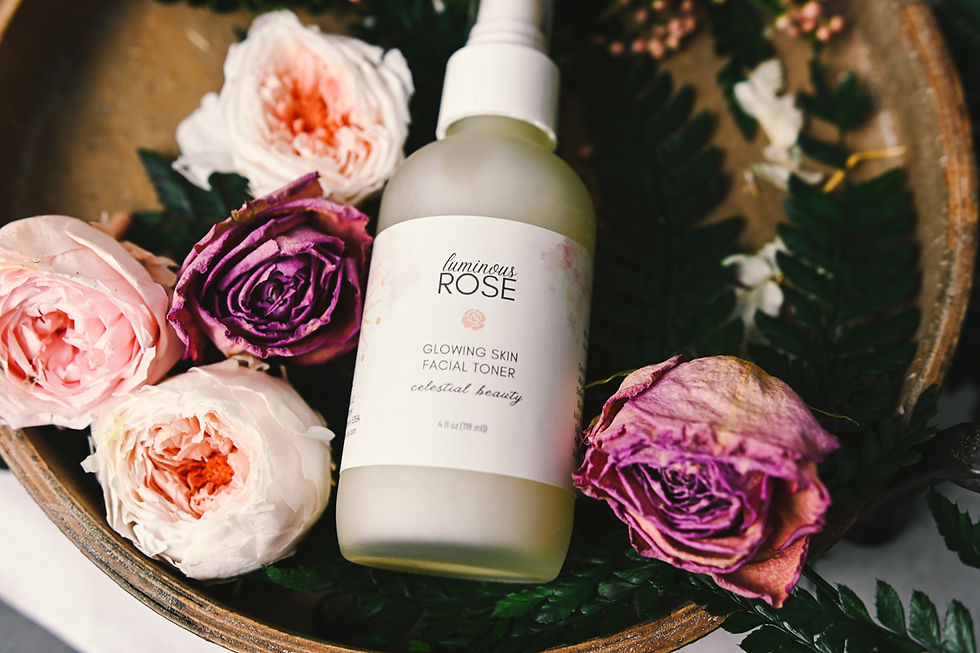When it comes to Alcohol in Skincare— which ones are safe?
- Maria

- Jan 30, 2024
- 3 min read

Alcohol is a common ingredient found in many skincare products. While it can have benefits such as helping to cleanse the skin and acting as a preservative, some types of alcohol can be harmful and drying to the skin.
When it comes to safe alcohols in skincare, look for ingredients such as
Fatty Alcohols
These fatty alcohols are moisturizing and can help to improve the texture of the skin.
cetearyl alcohol, obtained from vegetable oils such as sustainable palm or coconut oil.
stearyl alcohol, a naturally occurring saturated fatty acid found in coconut oil.
behenyl alcohol, derived from vegetable sources such as corn.
cetyl alcohol, derived from vegetables sources like coconut or sustainable palm.
Aromatic Alcohols
Another type of alcohol found in skincare are aromatic alcohols. These are predominantly used for fragrance and as a preservative.
Benzyl alcohol is an alcohol that naturally occurs in certain fruits, like apricots, and a variety of essential oils, like ylang-ylang and jasmine. Benzyl alcohol functions by killing or preventing the growth of a broad spectrum of bacteria, yeasts and molds and imparts a floral-like scent to cosmetic products. Although irritating in high amounts, it is considered safe at the small concentrations in which it is used in cosmetics.
Phenethyl Alcohol is produced by microorganisms and plants and is naturally found in some essential oils like rose, neroli or geranium, certain foods, spices, tobacco and in undistilled alcoholic beverages. It imparts a rose-like fragrance to skincare products and protects them from spoilage by preventing bacterial growth.
Aromatic alcohols are considered safe in small concentrations and the potential for allergenicity is low, but they can be an irritant and cause itching for some people.
On the other hand, avoid ingredients such as
Alcohols to Avoid in Skincare
Denatured Alcohol a common ingredient in many skincare products. It is often used to help dissolve other ingredients and to help the product spread more easily on the skin. However, denatured alcohol can also be very drying and irritating to the skin, particularly for those with sensitive skin. It can strip the skin of its natural oils, leading to dryness, flakiness, and even redness and inflammation.
Looking for a facial cream to help soothe sensitive skin? Click HERE.
Isopropyl alcohol, also known as rubbing alcohol, is a common ingredient found in skincare products such as toners, astringents, and cleansers. While it is known for its ability to kill bacteria and remove excess oil from the skin, it can also have some negative effects. Isopropyl alcohol can strip the skin of its natural oils, leading to dryness and irritation. This alcohol can disrupt the skin's natural pH balance, which can lead to a host of other issues such as breakouts and inflammation.
Looking for a toner that uses hydrosols and plant extracts and not alcohol to balance skin's pH? Click HERE.
SD alcohol (specially denatured) is a type of alcohol that is commonly used in skincare products. It is also known as denatured alcohol or ethanol. While it can be effective in removing excess oil and impurities from the skin, it can also be very drying and irritating. This is because SD alcohol can strip the skin of its natural oils and disrupt the skin's moisture barrier.
In conclusion, scientific findings show that fatty alcohols are beneficial in skincare. As with any skincare ingredient, it's important to do your research if you have any concerns or questions about alcohol in your skincare routine.
Looking for products that will illuminate your skin naturally? Shop Luminous Rose!





Comments